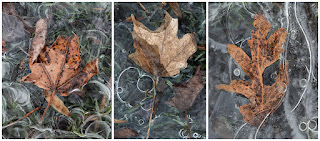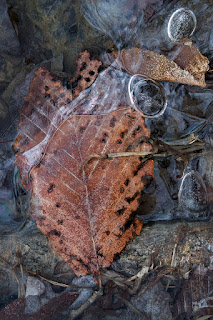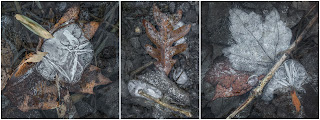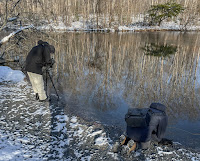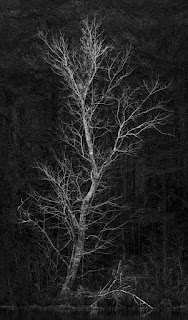- William Kingdon Clifford (1845 - 1879)
Thursday, January 20, 2022
Kandinskian Delights
Wednesday, January 19, 2022
Nature's Simplicity
"I should like to propose that we look at this element of freshness, of newness, of strangeness, as a thread along which to place the activities of the consciously creative artist, the conscious patron and critic of the creative artist, and the common man — common in the sense that he has no specified part in creation or criticism. If we make one criterion for defining the artist (as distinct from the craftsman and the trained but routine performer of dance, drama, or music) the impulse to make something new, or to do something in a new way — a kind of divine discontent with all that has gone before, however good — then we can find such artists at every level of human culture, even when performing acts of great simplicity."
Tuesday, January 18, 2022
Early Morning Walk
a blessing for the whole day."
- Frédéric Gros (1965 - )
A Philosophy of Walking
Sunday, January 16, 2022
Janusian Creativity
- Ainissa Ramirez (1969 - )
Postscript. I have written before about my lifelong penchant for sometimes seeing things not so much visually (at least, at first), but as free-form assemblages of rapid-fire associations and memories that percolate up from my unconscious. A recent example was when an obscure (and certainly not consciously retrievable) passage from a novel by Vonnegut I last read about 30 years ago made my head swivel to look at an equally obscure stain on a piece of driftwood. A similar experience made me look at what in "reality" is nothing but leaves entangled in a bit of ice, but which I "saw" as a melodic string that went, "Janus, Kandinsky, and Yin|Yang." This is close to literal truth. My brain was reacting to this string of associations before I consciously "recognized" what my eye/brain/I was actually looking at! These experiences are far from unique for me, but sadly do not appear very often. But when they do... Ahh, pure magic and joy; a Janusian creative moment, one might say 😊
Saturday, January 15, 2022
Signs of Nature
"Morphology rests on the conviction that everything that exists must signify and reveal itself. From the first physical and chemical elements to the spiritual expression of man we find this principle to hold. We turn immediately to that which has form. The inorganic, the vegetative, the animal, the human. Each one signifies itself, each one appears as what it is to our external and our internal sense. Form is something changeable, something becoming, something passing. The doctrine of metamorphosis is the key to all of the signs of nature."
Friday, January 14, 2022
Fine-Tuning
Postscript. And so, we have a repeat of the "apology" I made a bit over a week ago, after posting a "poor quality" iPhone image captured while out on my morning walk with my wife. But I continue to be mesmerized by the (unfortunately, dwindling number of) ice abstracts our walks sometimes reveal. This one is from this morning. And, as before, I am looking forward to resuming an earnest search for "otherworldly vistas" (with "real" camera in hand) tomorrow, as some cold weather is again predicted over the next few days. Stay tuned 🙂
Tuesday, January 11, 2022
Invisible Links
"In my youth I regarded the universe as an open book, printed in the language of physical equations, whereas now it appears to me as a text written in invisible ink, of which in our rare moments of grace we are able to decipher a small fragment.
Monday, January 10, 2022
Different Schemes and Patterns
Ernst Cassirer (1874 - 1945)
An Essay on Man
Sunday, January 09, 2022
Ceaselessly Creative
the most complex system
we know of in the universe,
breaks no law of physics,
yet is partially lawless,
ceaselessly creative."
- Stuart Kauffman (1939 - )
Saturday, January 08, 2022
Nonlinear, Experiential, and Receptive
"The creative process,
like a spiritual journey,
is intuitive, non-linear,
and experiential.
It points us toward
our essential nature,
which is a reflection of
the boundless creativity
of the universe.
...
To be still means to
empty yourself from the
incessant flow of thoughts
and create a state of
consciousness that is
open and receptive."
- John Daido Loori (1931 - 2009)
Friday, January 07, 2022
Wiggly Order
- Alan Watts (1915 - 1973)
The Tao of Philosophy
Wednesday, January 05, 2022
Being, Meaning, and Another Order
"Each person is at each moment capable of remembering all that has ever happened to him and of perceiving everything that is happening everywhere in the universe. The function of the brain and nervous system is to protect us from being overwhelmed and confused by this mass of largely useless and irrelevant knowledge, by shutting out most of what we should otherwise perceive or remember at any moment, and leaving only that very small and special selection which is likely to be practically useful.
Tuesday, January 04, 2022
Embodied Network
- David George Haskell (1969 - )
The Songs of Trees
Friday, December 31, 2021
A Vast Pattern
Thursday, December 30, 2021
Universal Spark
- David Deutsch (1953 - )
The Beginning of Infinity
Sunday, December 26, 2021
Limits of Comprehension
the problem of the universe,
but to find out what he has to do;
and to restrain himself within
the limits of his comprehension."
- Johann Wolfgang von Goethe (1749 - 1832)
Saturday, December 25, 2021
Perceive the Inconceivable
- Carlos Castaneda (1925 - 1998)
The Art of Dreaming
Friday, December 24, 2021
Curious Air of Hyper-Reality
"I suppose it is submerged realities that give to dreams their curious air of hyper-reality. But perhaps there is something else as well, something nebulous, gauze-like, through which everything one sees in a dream seems, paradoxically, much clearer. A pond becomes a lake, a breeze becomes a storm, a handful of dust is a desert, a grain of sulphur in the blood is a volcanic inferno. What manner of theater is it, in which we are at once playwright, actor, stage manager, scene painter and audience?"
Wednesday, December 22, 2021
Between Immensity and Eternity
Monday, December 20, 2021
Geological Time
"In reality, a river's basic shape... is not a line but a tree. A river is, in its essence, a thing that branches... Although it flows inward toward its trunk, in geological time it grew, and continues to grow, outward, like an organism, from its ocean outlet to its many headwaters. In the vernacular of a new science, it is fractal, its structure echoing itself on all scales, from river to stream to brook to creek to rivulet, branches too small to name and too many to count."
Sunday, December 19, 2021
Pure Experience
- D.T. Suzuki (1870 - 1966)
An Introduction to Zen Buddhism
Saturday, December 18, 2021
The World is Sacred
it is full of gods, numina,
great powers and presences.
We give some of them names –
Mars of the fields and the war;
Vesta the fire;
Ceres the grain;
Mother Tellus the earth;
the Penates of the storehouse.
The rivers, the springs.
And in the stormcloud and
the light is the great power
called the father god.
But they aren’t people.
They don’t love and hate,
they aren’t for or against.
They accept the worship due them,
which augments their power,
through which we live."
Friday, December 17, 2021
World of Imagination
"I know that this world is a world of imagination and vision. I see every thing I paint in this world, but everybody does not see alike. To the eyes of a miser a guinea is far more beautiful than the Sun, and a bag worn with the use of money has more beautiful proportions than a vine filled with grapes. The tree which moves some to tears of joy is in the eyes of others only a green thing which stands in the way. Some see nature all ridicule and deformity, and by these I shall not regulate my proportions; and some scarce see nature at all. But to the eyes of the man of imagination, nature is imagination itself."
Wednesday, December 15, 2021
Portals of Consciousness
it follows us at every instant;
all that we have felt, thought
and willed from our earliest
infancy is there, leaning over the
present which is about to join it,
pressing against the portals of
consciousness that would
fain leave it outside."
- Henri Bergson (1859 - 1941)
Tuesday, December 14, 2021
Forget About Words
once you've caught the fish,
you can forget about the trap.
A rabbit-snare is for catching rabbits;
once you've caught the rabbit,
you can forget about the snare.
Words are for catching ideas;
once you've caught the idea,
you can forget about the words.
Where can I find a person who
knows how to forget about words
so that I can have a few
words with them?"
- Chuang Tzu (c.369 B.C. - c.286 B.C.)
The Essential Writings
Monday, December 13, 2021
Meeting of Possibilities
"This accidental
meeting of possibilities
calls itself I.
I ask: what am I doing here?
And, at once, this I
becomes unreal."
- Dag Hammarskjöld (1905 - 1961)
Markings
Sunday, December 12, 2021
A Magical Illusion
- Alan Watts (1915 - 1973)
Saturday, December 11, 2021
We Are All One
- Nikola Tesla (1856 - 1943)
The Problem of Increasing Human Energy
Friday, December 10, 2021
Mental Categories
mighty matter,
irresistible march of evolution,
reality ever newborn;
you who, by constantly
shattering our mental categories,
force us to go ever further
and further in our
pursuit of the truth."
- Pierre Teilhard de Chardin (1881 - 1955)
Hymn of the Universe
Thursday, December 09, 2021
Beyond the Tangible
see with his mind what he
cannot see physically
with his eyes...
Abstract art enables the artist
to perceive beyond the tangible,
to extract the infinite
out of the finite.
It is the emancipation
of the mind.
It is an exploration
into unknown areas."
Tuesday, December 07, 2021
Neither Obverse nor Reverse
encompasses the world and
has neither obverse nor reverse
nor circling nor secret center."
- Jorge Luis Borges (1899 - 1986)
In Praise of Darkness
Sunday, December 05, 2021
A Sea of Forms
"A work of art is an abstract or epitome of the world. It is the result or expression of nature, in miniature. For, although the works of nature are innumerable and all different, the result or the expression of them all is similar and single. Nature is a sea of forms radically alike and even unique. A leaf, a sun-beam, a landscape, the ocean, make an analogous impression on the mind. What is common to them all, — that perfectness and harmony, is beauty. The standard of beauty is the entire circuit of natural forms, — the totality of nature; which the Italians expressed by defining beauty "il piu nell' uno." Nothing is quite beautiful alone: nothing but is beautiful in the whole. A single object is only so far beautiful as it suggests this universal grace. The poet, the painter, the sculptor, the musician, the architect, seek each to concentrate this radiance of the world on one point, and each in his several work to satisfy the love of beauty which stimulates him to produce. Thus is Art, a nature passed through the alembic of man. Thus in art, does nature work through the will of a man filled with the beauty of her first works.
The world thus exists to the soul to satisfy the desire of beauty. This element I call an ultimate end. No reason can be asked or given why the soul seeks beauty. Beauty, in its largest and profoundest sense, is one expression for the universe."
Saturday, December 04, 2021
Slow Time
is not, and soul commingles
with mist, and rock, and light. In time,
soul brings the misty self to be.
Then slow time hardens self to stone
while ever lightening the soul,
till soul can loose its hold of self
and both are free and can return
to vastness and dissolve in light,
the long light after time."
- Ursula K. Le Guin (1929 - 2018)
"How It Seems To Me" in So Far So Good
Friday, December 03, 2021
The Sentinel
"Think of such civilizations,
far back in time against the
fading afterglow of creation,
masters of a universe so
young that life as yet had come
only to a handful of worlds.
Theirs would have been
a loneliness of gods
looking out across infinity
and finding none to
share their thoughts."
Thursday, December 02, 2021
Longing
- Hermann Hesse (1877 - 1962)
Wandering
Wednesday, December 01, 2021
Slow Growth
- Alexander Graham Bell (1847 - 1922)
Monday, November 29, 2021
Patterns
but patterns that perpetuate themselves."
- Norbert Wiener (1894 - 1964)
The Human Use of Human Beings: Cybernetics and Society
Saturday, November 27, 2021
Constructions in Space
- Bernhard Riemann (1826 - 1866)
Friday, November 26, 2021
Vuja de
Wednesday, November 24, 2021
Unfathomable Mystery
we won’t ever unravel its secrets.
Thus we must treat the world as it is:
a sheer mystery."
- Carlos Castaneda (1925 - 1998)
Tuesday, November 23, 2021
An Illusion, a Phantom, or a Dream
“So I say to you –
This is how to contemplate our
conditioned existence in this fleeting world:
'Like a tiny drop of dew,
or a bubble floating in a stream;
Like a flash of lightning
in a summer cloud,
Or a flickering lamp, an illusion,
a phantom, or a dream.'
'So is all conditioned
existence to be seen.'
Thus spoke Buddha."
Monday, November 22, 2021
Macro and the Micro
- Ansel Adams (1902 - 1984)
Letter to Alfred Stieglitz
Postscript. The purest simplest joy of life is life itself: living, being, breathing, seeing, feeling, sharing, ... But there are preternaturally precious moments when the experience is so all-consuming and so far transcends what words alone are incapable of revealing (though the wisest among us are sometimes able, in Zen-like fashion, to capture glimpses of the deepest truths), that one is simply lost in the Einsteinian awe of it all ("I have nothing but awe when I observe the laws of nature," as quoted in Einstein and the Poet). For me, this happens (alas, far less frequently than I wish) when I become "lost" amidst the "macro and the micro"; when otherwise arbitrary language-driven distinctions among trees and forest and leaves and space and time ... all dissolve and become one and inseparable. A feeling that seems to be also shared by my eldest son, Noah, who is seen here contemplating his own universe of mysteries by the side of a small footpath he and I took this weekend in a local park:
Sunday, November 21, 2021
This Place is a Dream
Only a sleeper considers it real.
...
A man goes to sleep in the town
where he has always lived,
and he dreams he's living
in another town.
He believes the reality of the dream town.
...
and then into being human,
forgotten our former states,
slightly recall being green again.
- Rumi (1207 - 1273)
Postscript. The triptych consists of three "quick grabs" with my iPhone during the trip my family and I took to the Pacific Northwest this past summer (e.g., see this blog entry). The left- and right-most images show the play of sunlight (reflected off the door of our car) with the pavement as we were going to breakfast one day in Sequim, WA. The middle panel shows a similar play of light (this time reflected off a kettle on our stove) with the stucco walls of the kitchen in the cabin we rented in the northern cascades. Most of my photography is quasi-deliberate, by which I mean that most of my images arise during planned "expeditions" (such as to a local park, or hikes on a family vacation 😊 using my "real" camera. But some of my favorite images - such the ones in this triptych - are captured purely by happenstance, and when my conscious "attention" lies elsewhere (such as on, say, getting breakfast at a restaurant or the first sip of coffee in the morning). Of course, any distinctions I may choose to draw among these various states of being and attention are, of course, at best illusory, and, at worst, utterly meaningless. Even as my "eye" looks toward the path to a restaurant or at the handle of a coffee kettle, my "I" never ceases to revel at the magic of light, color and form that surrounds us in each moment in time and space!
Saturday, November 20, 2021
Timeless Way of Building
in truth a network,
which perfectly captures it."
Thursday, November 18, 2021
Heaven and Earth
'Nothing?' I asked.
'Not even heaven?'
He lowered his head and was silent.
But after a moment:
'Heaven is too high for me.
exceptionally good–and near me!'
'Nothing is nearer to us than heaven.
The earth is beneath our feet
and we tread upon it,
but heaven is within us.'"



